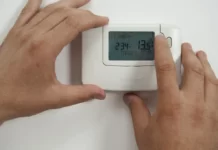Scaling is when minerals like calcium and magnesium build up on surfaces, especially in water systems, heaters, tanks’ or machines. Scaling is what happens to a tankless water heater when the minerals in the water supply settle and build up over time on the heating elements or other areas inside the unit. This mineral growth can make it hard for heat to move, lower the heater’s efficiency, and cause problems or damage if it’s not taken care of.
Descaling, conversely, is the process of removing these mineral layers or scales from the tankless water heater’s surfaces. To do this, an acidic solution is used to break up the minerals, and then the system is flushed with clean water to eliminate any leftover waste. Descaling is important to ensure the unit works well and lasts as long as possible, that heat is transferred well, and that problems caused by scale buildup are avoided. This Descaling can be performed using a commercial acidic solution or simply by using vinegar.
Tankless water heaters are becoming more popular in our homes because they save energy and never run out of hot water. But, like any other device, they need regular maintenance to work well and last as long as possible. Descaling is an important part of taking care of a tankless water heater. This post will talk about how important it is to clean the scale off tankless water heaters and how to do it.
Importance of Descaling Tankless Water Heaters for Optimal Performance
Why it’s important to descale:
a. Eliminate Mineral buildup: Tankless water heaters heat water as it runs through, which can cause minerals to stick to the water. Over time, minerals like calcium and magnesium can build up on the unit’s heating elements or inside surfaces. This makes it less efficient and slows down the movement of heat.
b. Poorer performance: Scaling can slow the water flow and make it harder for the heater to reach and keep the right temperature. This can lead to insufficient hot water, longer wait times or changes in the temperature of the water.
c. Possible Damage: If you don’t descale a tankless water heater, you could have bigger problems like rust, leaks, or even system failure. Regular Descaling keeps expensive fixes from happening and makes the unit last longer.
How Descaling Works
a. Acidic Solution: When descaling, you use an acidic solution that removes mineral deposits. Most people use citric acid or vinegar to remove the scale because they work well and are safe for the unit.
b. Flush the System: To start the descaling process, the water heater is usually disconnected from the water supply and the power source. Next, the acidic solution is pumped through the machine to break up the mineral deposits. The answer is left in the system to ensure that Descaling is done well.
c. Flushing with Water: After the descaling solution has done its job, the system is flushed with clean water to remove any leftover residue. This step helps the water heater work at its best and ensures no acidic solution is left in the unit.
Descaling Frequency
How frequently you would need Descaling depends on many factors, the most important of these are:
a. Manufacturer’s Guidelines: It is important to follow the manufacturer’s instructions about how often to descale. But as a general rule, portable water heaters should be cleaned of scale once a year to keep them working well and stop the scale from building up.
b. Water Hardness: How often you need to descale may depend on how hard the water is where you live. Hard water has a higher percentage of minerals and may need to be descaling more often. Keeping an eye on the hardness of the water and how well it works can help you figure out how often you should descaling.
Professional Service: Do it Yourself or Hire a Pro?
The homeowner can descale tankless water heaters if they are good at simple maintenance. But some people would rather hire a professional plumber or follow the instructions from the maker. Professionals have the knowledge and tools to ensure that Descaling is done well and can take care of any other upkeep needs.
What Makes Water Based Systems and Heaters Scale Up More?
Scaling happens in water-based systems because the minerals, mostly calcium and magnesium, dissolve in the water. These minerals can form deposits or scale on different areas in the system. Here are the main reasons why things scale:
Hard Water: Scaling is often caused by water that is too hard. There are a lot of nutrients in it, especially calcium and magnesium ions. When minerals in hard water are heated or evaporated, they can stick to surfaces like pipes, heating elements, and tools like water heaters.
High Water Temperature: Scale can form faster in higher temperatures. When water is warm, minerals become less able to dissolve in it, which causes them to settle out and form scale.
Evaporation: When water evaporates, it leaves behind more concentrated minerals, which can lead to scaling. This is easy to see in places where it is hot and dry, and water evaporates fast.
Bad Water Treatment: Scaling can be caused by bad water treatment. Minerals are usually taken out of municipal water supplies through treatment methods. But some places may have water sources with more minerals or aren’t treated well enough, making scaling more likely.
Unbalanced pH: Water with a high or low pH level can make scaling more or less likely. Extremely acidic (low pH) or alkaline (high pH) water can cause minerals to stick together and cause scaling.
Longer heating cycles: Constant heating cycles or staying in hot water for a long time can help scale form. This is especially important for tankless water heaters, which heat water as it flows through, giving scale more time to build up if it isn’t properly cared for.
Tankless Water Heater Descaler Vs Vinegar
Whether you use vinegar or a descaler for your tankless water heater depends on how bad the scaling is, your preference, and the availability of the products. A commercial descaling solution may work better if there is mild to heavy scale buildup. Conversely, vinegar can be a practical and cost-effective choice for routine care and mild scaling. For the best results and to protect the tankless water heater, following the manufacturer’s instructions and safety measures for any descaling method you choose is important.
Commercial descalers and vinegar can work well when it comes to descaling a tankless water heater. Here’s what’s different about the two choices:
Tankless Water Heater Descaler:
• Effectiveness: Commercial descaling solutions are made in a way that makes it easy to get rid of mineral buildup. They often have stronger acids or descalers that work well to remove hardened scales.
• Speed: Most descalers made for water heaters without a tank work faster than vinegar. They can break down scale layers more quickly, making the Descaling process take less time.
• Ease of Use: Most commercial descalers come with clear directions, which makes them easy to use. They are made to remove scale from particular appliances, like tankless water heaters, so they work best.
• Safety: Some descalers have stronger acids or chemicals, so it’s important to be careful with them. When using commercial descaling solutions, it’s important to follow the directions from the maker, wear protective gloves, and ensure there’s enough airflow.
Vinegar
• Effectiveness: Vinegar, especially white vinegar, has low acidity and can dissolve mineral deposits well. It works well for tankless water heaters with mild to moderate scaling problems.
• Cost: Vinegar is an easy-to-find and cheap way to eliminate scale. It is a common home item that can be found in most kitchens. This makes it easy to use to remove scale quickly.
• Safety: Vinegar is a natural and non-toxic domestic solution that is usually safe. But it is still an acid, so it should be treated carefully. It’s important not to get the fumes in your eyes, on your skin, or in your lungs. When using vinegar to clean, you should ensure enough airflow.
• Time: Vinegar may need to soak longer than professional descalers. It may need to stay in the portable water heater for a long time to remove the scale buildup.
A tankless water heater can be cleaned without harsh chemicals using vinegar. Here’s how you can clean your unit with vinegar:
1. Get what you need: White vinegar with a 5% acidity level, a jar or bucket, a water source, a funnel (if needed), and a soft cloth or sponge.
2. Please stop the flow of water: Find the button that stops the flow of water to your tankless water heater and turn it off.
3. Turn off the power: Turn off the power to the water heater at the circuit breaker or by following the advice from the manufacturer.
4. Empty the hot water tank: Connect a line to the tankless water heater’s drain valve and lead the other end to a drain or bucket. Open the drain opening and let all the water drain from the unit. Take care, because the water might still be hot.
5. Prepare a mix of vinegar and water: Measure the right amount of white vinegar based on the size of your water tank. One part vinegar to three parts water is a usual mix. For example, if your tankless water heater holds 5 gallons, use 1 gallon of vinegar and 3 gallons of water. You can use a tube to pour the solution into the water heater if you need to.
6. Move the vinegar solution around: Close the drain valve and open the water supply valve. This lets the vinegar solution fill the tankless water heater. Let the solution move through the system for about an hour, ensuring it reaches all the scaling-affected parts.
7. Flush with clean water: After the set time, close the water supply valve, open the drain valve, and flush the tankless water heater with clean water. This step will remove the unit’s vinegar solution and any dissolved scale. Keep the drain valve open until the water is clear.
8. Fix the electricity and water: Turn the power back on to the water heater and open the water supply valve. Then close the drain valve. Let the tankless water heater fill up and get to the desired temperature before you use it.
Conclusions:
Descaling is an important part of maintaining tankless water heaters so that they work well and last as long as possible. By taking care of mineral buildup with regular Descaling, homes can avoid a drop in performance, damage, and expensive repairs. Whether you do the descaling yourself or hire a professional, following the manufacturer’s instructions and keeping a regular descaling plan will help you have a steady supply of hot water and get the most out of your tankless water heater for years to come.
By knowing what causes scaling, you can avoid it and use effective water treatment strategies to keep it from happening as much as possible. Regular maintenance, like Descaling and water softener, can help reduce the effects of scaling, making sure that water-based systems work well and last as long as possible.
Check the guidelines or user manual for specific directions for your tankless water heater. Also, ensure enough airflow while you’re descaling, and take all the safety measures you need when handling vinegar. Using vinegar to descale your tankless water heater regularly can help keep it working well and the scale from building up.














